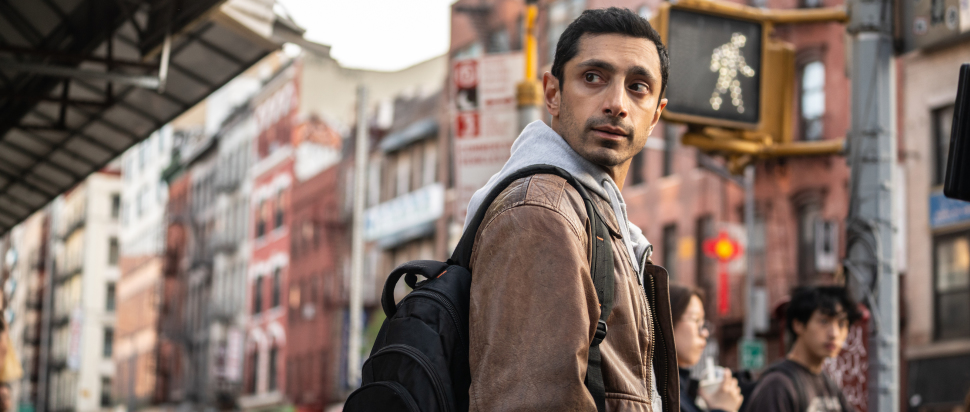Scotland on Screen: David Mackenzie on Relay
David Mackenzie returns with the sharp and twisty Relay. We catch up with Scotland's most prolific filmmaker to discuss his success in the States, his channelling of 70s paranoid thrillers in Relay and why he tries to avoid repeating himself
David Mackenzie is a difficult director to pigeonhole. When BAFTA hand him his inevitable lifetime achievement award, the showreel will be all over the shop. His mainstream breakthrough was the muscular prison movie Starred Up (2013), which he followed up with the Oscar-nominated neo-western Hell or High Water (2016), and then epic Scottish period drama Outlaw King (2018). But by Starred Up, Mackenzie was already a veteran, with six wildly different features under his belt, including a whimsical coming-of-age film centred on an adorable Peeping Tom with an Oedipus complex (Hallam Foe, 2007), a soulful romance taking place during a mysterious global pandemic (Perfect Sense, 2011) and a glossy LA sex comedy starring Ashton Kutcher (Spread, 2009).
“I never want to do things the same way twice,” Mackenzie tells me on a video call from his home in Joshua Tree, California, when I ask about the eclecticism of his film projects. He reckons this instinct to continually switch things up was instilled early in his career. “When I was making Hallam Foe in Edinburgh, I thought, 'All I'm doing is just battling here'. I was fighting a dragon, and the dragon was the schedule, just what you've got to do in a day. And I was like, 'This is not creative.'” He promised himself that he wouldn't get stuck in a similar situation. “Since then, I’ve tried to keep evolving my methodology so that you can be creative even within the limited time frame you’ve got, and you don't have to just do it one way or another.”
The Scot continues to surprise with his upcoming slate. Early next year, he'll release Fuze, a London-set heist movie, but before that, there's another nifty genre flick: Relay. It’s a hugely enjoyable surveillance thriller set in New York starring Riz Ahmed as Ash, an anonymous fixer who helps potential whistleblowers walk away from sticky situations with their corrupt employers. It’s satisfyingly old-school in Ash’s use of trains and the US Postal Service to circumvent detection as he runs rings around his hi-tech opponents. And our hero keeps his identity a secret using an ingenious analogue method: he communicates with his clients using the New York Relay, a service that allows deaf people to place calls by having operators read aloud their text messages.
Like Hell or High Water, Mackenzie’s finest film to date, Relay is a deeply American film. It doesn’t feel like a European director slumming it in US genre filmmaking: Mackenzie clearly knows and loves this breed of paranoid crime thriller. Does he feel, after living in the US for several years, that he’s part of the furniture in Hollywood? “Oh, no, not at all,” he says. “You know, I’ve made 12 films, but only three are American, so I’m still an outsider here.”
He does agree, though, that he’s part of the lineage of émigré filmmakers whose outsider eyes have captured their new environments astutely. “I often talk about Roman Polanski’s British movies being among the most British of them all, and there’s an argument for Lars von Trier’s Breaking the Waves as one of the greatest Scottish films. It sometimes takes an outsider's vision to capture a place because you don't know the nuances, so you just play with the images to produce a film that has the right resonance. I definitely felt that in Hell or High Water, going into the world of Texas, which I only knew through spending two weeks there visiting a friend. That was all the experience I had, so I just had to trust the material and let the landscape do the work.”
Place is strongly evoked, too, in Relay: it’s a great New York movie. “I've always wanted to make a film in New York,” says Mackenzie. “And I was definitely channelling some of those great 70s New York-based thrillers” – think Klute, Three Days of the Condor and The Conversation – “in all sorts of ways. The paranoia and loneliness of New York, and the sort of intensity of being lost in the big city were important flavours in the film.”
Many reviewers have picked up on the influence of 70s cinema on Relay, but don't mistake it for a throwback. It may call to mind the past in its style and in Ash’s use of pre-digital tech in his espionage, but Mackenzie’s certainly got something to say about our over-surveilled modern world too. “That's really where the heart and soul of the film is for me,” he explains. “It's about how to keep below the radar.” He also notes that few critics seem to be picking up on the contemporary significance of Relay’s big bad. “No one seems to have noticed in interviews so far, but the film is also, dare I say, taking a little bit of a dig at the pharmaceutical industry, which is not an easy industry to criticise in this business: you know, they sponsor the Oscars and they're heavily involved in the media. The film is small p politics, rather than big P politics, of course, and I guess lots of people see it in terms of its 70s influences, and I'm happy to channel a bit of that. But for me, this is New York today; it’s about the here and now.”
Relay is out now via Black Bear
Filmmography: Fuze (2025), Relay (2024), Outlaw King (2018), Hell or High Water (2016), Starred Up (2013), You Instead (2011), Perfect Sense (2011), Spread (2009), Hallam Foe (2007), Asylum (2005), Young Adam (2003), The Last Great Wilderness (2002)
